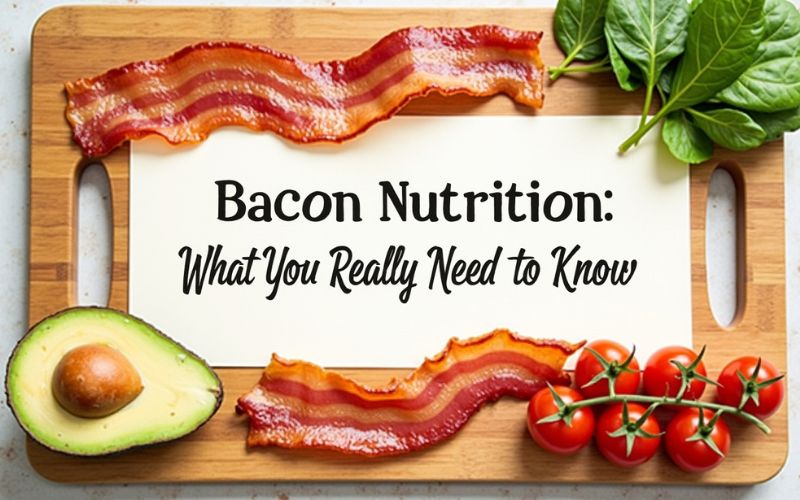Bacon nutrition facts guide is more than just the flavor of the month at breakfast, it’s become a topic of national nutrition debate and dietary scrutiny. Whether you’re tracking your macros, watching your sodium intake, or simply curious, understanding what’s in bacon can help you make more informed food choices. It contains essential nutrients, including protein and various micronutrients, but also delivers a significant amount of fat, cholesterol, and sodium.
People Google questions like Is bacon good for you or How many calories are in bacon, so this guide covers those questions. From nitrate-free bacon nutrition facts guide per slice, this comprehensive guide helps you decide on how to include bacon as part of your diet, especially if you’re on a keto diet. Unpack the facts and controversies that go into each slice.
Understanding Bacon’s Macronutrients
- A single slice of pork bacon has approximately 42 to 45 bacon calories, depending on the cooking method and thickness.
- Loaded with Fat Bacon is loaded with fat; a single slice contains about 3.3 grams of total fat per slice, of saturated fat bacon.
- Every slice delivers about 3 grams of bacon protein, which helps with muscle recovery and keeps you feeling full.
- These macros will fluctuate whether you eat your bacon raw, pan-fried, oven-baked, or microwaved.
- Nutritional content in bacon does vary by brand, but it is high in fat and protein in nearly all varieties.
- Surprisingly, bacon can provide you with energy and some nutrients if you have it in moderation and a well-balanced meal.
Calories in Bacon: How Much Are You Really Eating?
- A single slice of pork bacon has approximately 42 to 45 bacon calories, depending on the cooking method and thickness.
- Loaded with Fat Bacon is loaded with fat; a single slice contains about 3.3 grams of total fat per slice, of saturated fat bacon.
- Every slice delivers about 3 grams of bacon protein, which helps with muscle recovery and keeps you feeling full.
- How many calories are in Bacon nutrition facts guide, you may ask. The answer: is 42 to 50 per slice for standard pork bacon.
- Bacon appears to shrink more but is calorie-dense because the moisture and fat have been mostly cooked out.
- The calories in bacon depend on how it is prepared Frying burns more fat while baking burns a bit less.
- The slices add up quickly: at four slices we are talking 180 to 200 calories, if not more.
- Being aware of your bacon nutrition per slice is useful for portion control, particularly when eating to lose weight.
- Keep track of servings to stay on track if you want to add bacon to your daily or weekly meal plan.
Fat and Protein in Bacon: Breaking Down the Nutrients
- Each slice amounts to about 3 grams of bacon fat, of which roughly 1 gram is saturated fat.
- The fat in bacon is comprised of both saturated and monounsaturated fats, which play various roles in the body.
- TOO much-saturated fat found in bacon may increase cholesterol if consumed often and is unbalanced.
- On the other hand, bacon protein is complete and promotes muscle repair, immune function, and satiation.
- Even for those who follow low-carb and ketogenic diets, keto diet bacon benefits are abundant, as bacon contains high-fat content and zero carbs.
- The macronutrient makeup of bacon also makes it a two-edged sword: nutrient-dense but calorie-dense.
Micronutrients in Bacon: The Hidden Benefits
- One slice provides you with 9–15 mg of cholesterol when consumed in excessive amounts can negatively impact heart health.
- One slice has more than 190 mg of sodium, which can make getting your daily dose pretty quick.
- Although bacon provides some health benefits, it’s high in salt and cholesterol and moderation is a necessity.
- Partnering bacon with fiber-filled foods can help beef up the health benefits by striking a sodium- and fat-fighting balance.
Nitrates and Additives: Should You Be Concerned?
- Vitamins that bacon does offer include B vitamins , such as B1, B2, B3, and B12 riboflavin, pantothenate (B5), pyridoxine (B6) folate, and vitamins like A and D, which are necessary for basic energy and metabolism.
- You can also get additional trace minerals from the nutritional value of cooked bacon: selenium, phosphorus, and zinc.
- Bacon also contains a significant amount of B vitamins such as B1, B2, B3, and B12, all of which allow the body to function properly and produce energy.
- Commercially made, store-bought bacon is preserved, and flavored and its color is set by nitrates and nitrites.
- Those preservatives have been associated with long-term health concerns, including cancer.
- Regular bacon nutrition facts guide includes nitrates and nitrites for preservation, flavor, and color.
- These preservatives have been associated with possible long-term health effects, such as cancer.
- Some nitrate-free bacon options rely on natural curing agents like celery powder but can still produce the same kinds of compounds.
Is Bacon Healthy to Eat in Moderation?
- The nutritional content of cooked bacon also includes traces of selenium, phosphorus , and zinc.
- Many people ask, does bacon have any health benefits? The answer lies in what and how much you eat.
- Bacon provides bacon nutrition fact guide protein, energy, and micronutrients, and similar to many foods can contribute to a healthy diet, but the downside can be its high contents of saturated fat and sodium.
- When enjoyed in moderation and small portions, bacon is a part of a healthy diet.
- Those with heart disease, hypertension, or kidney issues should be especially cautious about how much bacon they eat.
- On the upside of the keto diet bacon benefits, bacon gives you good fats and very few carbohydrates to help with fat metabolism.
- Combine bacon with whole foods such as vegetables and eggs to counteract dietary disparities.
- Choosing nitrate-free bacon can reduce your intake of synthetic preservatives, but it won’t staunch your nitrate intake altogether.
- 2 Processed meats, like bacon: Eating too much can inflame you.
- If you’re sodium-conscious and health-conscious, go for organic, low-sodium, and naturally cured (even though organic is best!) when you can.
Comparing Bacon Types: Pork vs. Turkey
- Nothing quite outdoes pork bacon; it has a great taste and is flavorful, also consuming high bacon fat and calories.
- Turkey bacon has a learner profile with a lot less calories about 25-30 per slice.
- But turkey bacon can have more sodium and additives than pork bacon.
- How many calories are in cooked bacon? The nutritional value of cooked bacon facts guide looks at the thickness of the meat and the way of cooking (baking vs. frying).
- It’s true that turkey bacon can seem over-processed and under-flavored to some, or that some might want to use it as a way to cut back on calories by replacing a more traditional breakfast meat.
- Do so according to your health goals, and always read the label for the fat, sodium, and additive information.
Can Bacon Fit Into a Diet Plan?
- Weight Watchers want to know is bacon high in carbs or sugar? Unadorned bacon has 0 carbs, but flavored varieties may contain 1–2g of sugar.
- When you are trying to lose weight, how many calories in bacon nutrition facts guide protein and fat is most important.
- If only eaten in moderation and not daily, bacon can be a part of weight loss.
- Using bacon in combination with high-fiber, low-calorie sides such as leafy greens or scrambled eggs helps create balance.
- You can have bacon 2 to 3 strips now and then once a week, especially if you are limiting it as a result of direct calorie restriction.
- Control added sugars and sodium by staying away from varieties of bacon like honey-glazed or maple-cured.
FAQs About Bacon Nutrition
A standard cooked pork bacon slice has about 42 to 50 bacon calories, depending on cooking method and cut.
Turkey bacon generally has fewer calories but may contain more sodium and preservatives than pork.
Crispy bacon loses fat in cooking, making it less fatty but possibly more calorie-dense per gram.
Nitrate-free bacon uses natural preservatives but still forms nitrates; it may be perceived as cleaner but not necessarily safer.
Yes, bacon protein and fat content make it a staple in keto diets, provided portions are controlled.
Mahnoor Ijaz is an SEO Expert with 2 years of hands-on experience in Blogging, Social Media Marketing, and Local SEO. She combines technical SEO skills with creative content strategies to boost online visibility and engagement.





